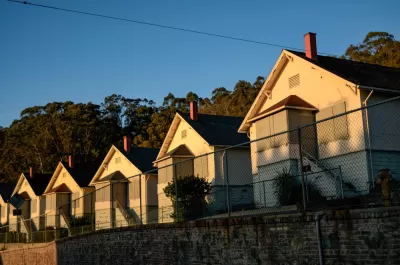As community land trusts take root and expand, they face numerous questions on how to stay communally-focused while their geographic scope grows.

"Community control" has as many meanings as "scale"—and as many meanings as "community." The baseline under it all is that properties have been permanently removed from the speculative market with their use to be determined for the good of a community, rather than for profit.
But that simple definition would also encompass publicly owned land and all nonprofit-owned land (not subject to Low Income Housing Tax Credit investor control). Typically, the intention of a CLT is for community control to go deeper than changing the name on the deed, aiming for something more like democratic control within their organization.
A classic CLT is a membership organization with members drawn from its service area. One-third of the board are CLT residents, elected by other CLT residents; one-third are community residents, elected by the members; with the remaining one-third being public representatives of other stakeholders, whether elected officials or professionals who support the mission. This is what makes a CLT different from a standard housing nonprofit, which may have a resident on the board, but rarely a majority, says Zach Murray, a CLT consultant who formerly worked for Grounded Solutions Network and the Oakland Community Land Trust (Oak CLT) in Oakland, California. "The democracy component is what separates the CLT from a traditional CDC, or even a housing authority," Murray says.
We’re creating space in the leadership of an organization for residents and for community members …. In housing, it’s really important that folks have a say in the communities that they live in. It’s different than just having a resident council or resident adviser group, actually having folks at the table to know the full extent of the operations of the organization.
When a CLT grows, the "community" in question can become more difficult to define. But to some extent it always was.
FULL STORY: Keeping Community Control as Community Land Trusts Grow

Alabama: Trump Terminates Settlements for Black Communities Harmed By Raw Sewage
Trump deemed the landmark civil rights agreement “illegal DEI and environmental justice policy.”

Study: Maui’s Plan to Convert Vacation Rentals to Long-Term Housing Could Cause Nearly $1 Billion Economic Loss
The plan would reduce visitor accommodation by 25% resulting in 1,900 jobs lost.

Planetizen Federal Action Tracker
A weekly monitor of how Trump’s orders and actions are impacting planners and planning in America.

Waymo Gets Permission to Map SF’s Market Street
If allowed to operate on the traffic-restricted street, Waymo’s autonomous taxis would have a leg up over ride-hailing competitors — and counter the city’s efforts to grow bike and pedestrian on the thoroughfare.

Parklet Symposium Highlights the Success of Shared Spaces
Parklets got a boost during the Covid-19 pandemic, when the concept was translated to outdoor dining programs that offered restaurants a lifeline during the shutdown.

Federal Homelessness Agency Places Entire Staff on Leave
The U.S. Interagency Council on Homelessness is the only federal agency dedicated to preventing and ending homelessness.
Urban Design for Planners 1: Software Tools
This six-course series explores essential urban design concepts using open source software and equips planners with the tools they need to participate fully in the urban design process.
Planning for Universal Design
Learn the tools for implementing Universal Design in planning regulations.
Caltrans
Smith Gee Studio
Institute for Housing and Urban Development Studies (IHS)
City of Grandview
Harvard GSD Executive Education
Toledo-Lucas County Plan Commissions
Salt Lake City
NYU Wagner Graduate School of Public Service




























